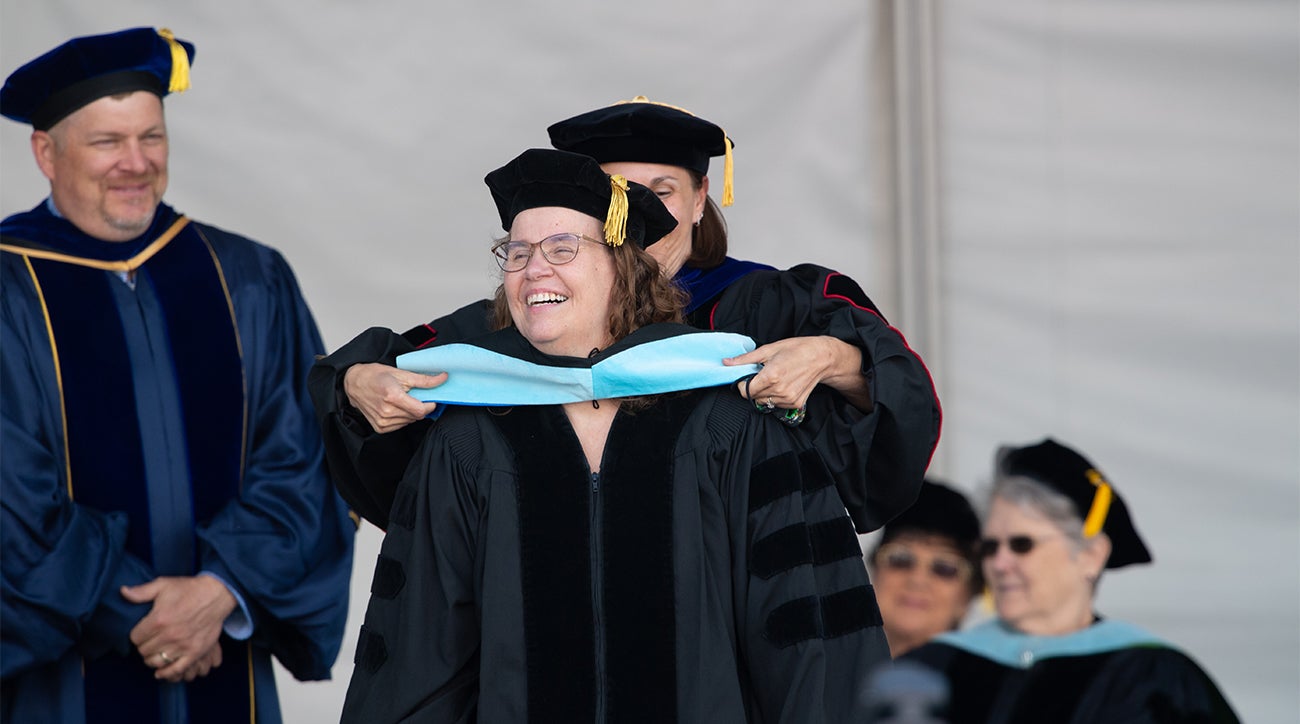
Boise State alum Elizabeth Schniedewind (EdD, curriculum, instruction and foundational studies, 2020) first became aware of barriers to health care for people who are deaf and hard of hearing when several of her friends and family members in that community struggled to make appointments with their doctors and dentists.
The Americans with Disabilities Act guarantees the right for people who are deaf and hard of hearing to receive help from an interpreter and other services when they set up health care appointments and during those appointments. But that doesn’t always happen, Schniedewind said. Clinic staff may hang up on callers who are deaf or refuse interpretation services at a healthcare provider’s office. This lack of access can lead to disparities in health care that have devastating effects over a person’s lifetime.
After Schniedewind, who is fluent in American Sign Language, moved to Boise from Spokane, Washinton to teach ASL and English interpretation, she enrolled in the doctoral program in curriculum and instruction in Boise State’s College of Education. She decided to look more closely at the health care access issue.
“Some people do research because it’s a job,” said Schniedewind, now a clinical associate professor teaching sign language interpretation and communication science at Idaho State University. “I’m doing this because I want to get results for people who need help.”
Schniedewind designed and co-authored a study in which participants – some who could hear, some who were deaf – placed scripted calls to 445 randomly chosen Idaho medical and dental care providers to request appointments.
People who are deaf make and receive phone calls using the federally funded video relay service in which the person who can hear uses spoken English over the traditional telephone and the person who is deaf uses American Sign Language via videophone, which is then interpreted. These calls often begin with an announcement by the interpreter that the call is coming from a person using sign language.
The researchers found that the participants who could hear were nearly twice as likely to book an appointment than the participants who were deaf. Clinic staff told the latter more frequently that offices were not accepting new patients, or that offices did not accept their insurance. Clinic staff also denied appointments to many callers who requested services like sign language interpretation, though the ADA grants it.
The Journal of the American Medical Association published Schniedewind’s study in 2021.
Steve Snow, executive director of the Idaho Council for the Deaf and Hard of Hearing and a co-author of the study, said the results reveal the gaps in health care access, something Snow, who is deaf, has experienced himself.
“Idahoans who are deaf and unable to access care through interpretation services often give up, affecting their health long-term,” Snow said. “The publication (of the research) in JAMA has brought more attention to this problem, and we hope to continue our research to develop solutions for Idahoans with hearing loss.”
Schniedewind recently received a $2.1 million grant from the Rehabilitation Services Administration, part of the U.S. Department of Education, to train healthcare interpreters for people who are deaf or hard of hearing. She said she hopes her research will one day address discrepancies in health care for people with a range of disabilities.
Grants and Scholarships
Grants from the National Institutes of Health and the Robert and Beryl Barr Fellowship through Boise State helped support the study.
“The curriculum and instruction doctoral program at Boise State allowed me to pursue a health care disparity and connected me with people across campus and in public health. The faculty at Boise State went above and beyond to get me the right committee to make the study happen.”Elizabeth Schniedewind